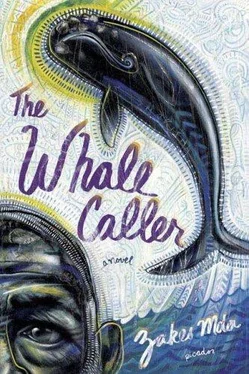“Ja, whatever you call it, Saluni… whatever you call it.”
“You didn’t rebel like this when I taught you window shopping. You ended up liking it.”
“Because it was private, Saluni. Not like here where people have built special temples for the ritual of eating… where eaters enact pagan rites of mating.”
“Now you are getting carried away, man,” says an astounded Saluni. “No one is mating anybody here. You are beginning to have wonderfully dirty thoughts… like me. People are just eating, that’s all.”
“It’s not just eating, Saluni. You and I know that with these people eating is part of lovemaking… part of…” He cannot bring himself to say it.
“Foreplay? You once uttered that word, man. What went wrong now? I thought you had got over your primness.”
“In private, Saluni. It was uttered between you and me… in the privacy of our bedroom.”
“I still don’t see the difference, man. We eat at supermarkets with our eyes…”
“Here, my dear Saluni, we are voyeurs of an orgy. This is where I put the full stop, Saluni. I am not going to be part of this window eating anymore.”
He steps aside. Saluni continues to stand at the window and to gormandise each of the dishes. But there is no fun in it if she can’t share the experience with him. The food tastes like paper. She is disappointed in him, and says so. He apologises and explains that this deification of food is a new experience for him. He eats to sustain himself, because if he does not eat he will die. His habits of eating are quite rudimentary. When he used to walk the coast he only needed to get fish, braai it on the open coal with maize on the cob and eat it. There was no ceremony. When he returned from the coast it became easier and cheaper to boil macaroni, sprinkle it with shredded cheese and eat. Again there was no ceremony
“You hate ceremony then, do you?” mocks Saluni. “But you are a creature of ritual. Like me, you are prone to ceremonial actions. You cannot pretend otherwise.”
The evening has been a disaster, and they walk home without a word to each other. She walks in front, almost trotting, and he follows leisurely behind. He is beginning to regret his outburst. Perhaps he should have just gone along with the ritual. It never hurts to be accommodative. But if he did Saluni would have expected them to visit the restaurants every weekend. Just as they visit the supermarkets at least once a week. He enjoys those visits. No one knows that they are eating from the displays of canned and boxed food. It is therefore private. Supermarkets are not temples built for the purpose of worshipping food. One buys the food and takes it to the privacy of one’s home. He can never bring himself to enjoy the vulgarities of public eating. He will just have to find a way of making it up to Saluni.
The next morning, after their ablutions, he brushes her hair and braids it into two long ropes. He files her nails and polishes them with Cutex. While he is at it he uses some of the nail polish to stop the runs on her nylon stockings. Indeed on the following days he pampers Saluni even more. In the mornings he goes to the flower market and buys her a flower — whatever flower is the cheapest that day. He takes her to the town centre to listen to blind buskers playing love standards on their violins, guitars or saxophones.
Nights rock the Wendy house, even on red days.
Although she never outrightly expresses gratitude to the Whale Caller for anything, she claims she is the happiest she has ever been, but he can see that something is missing in her life. She mopes around and is down-spirited. She looks depressed, and he knows why. The Bored Twins.
“Why don’t you go and see them,” he asks out of the blue one day. “I think they are missing you too.”
“And then you are going to bitch about it? No, I am not going.”
“When did I bitch about anything, Saluni?”
“I know you don’t like them, and God knows what those little angels ever did to you.”
“It’s not that I don’t like them, Saluni. I just don’t want you to be so dependent on them. I don’t mind if you see them once in a while. Not every day. I need you too, Saluni, you know that. Some days I need to spend the whole day with you.”
She goes to the mansion. And euphoria returns to her. He continues to pamper her, which depletes his financial resources — especially the daily flower that he insists on buying despite the abundance of tulips and the offerings on the collection plates of the blind musicians. But he does not mind. What matters is that they are both happy and many days pass without a single quarrel between them. She indulges him by talking to him sweetly, in a bluesy musical voice, and by being generally pleasant to him even when she thinks he is being stiff and stupid.
One afternoon on her way home from the mansion she visits Mr. Yodd. It is not a spur-of-the-moment decision. She has been planning the visit the whole day. And for the whole day a conflict has been brewing in her head as to whether to go or not to go. She brings with her a bunch of tulips from the mansion and walks down the crag to the grotto. This time she kneels down on some jagged stones and arranges the tulips around the small entrance as a propitiation rite. The stones under her knees are far from comfortable, and she wonders how the Whale Caller managed to kneel here — sometimes for hours on end. Perhaps it was part of his mortification: the very quest to put the flesh to death that made him deny himself the pleasures of fish, even though he could afford it, and live on an unchanging insipid diet. He may not frequent Mr. Yodd anymore, but he is still a flagellant at heart. The quest that today makes him deny himself the Bored Twins, despite himself.
Saluni can hear some squeaking and rustling sounds inside. Perhaps the rock rabbits are fighting. Or nursing babies. Or just enjoying one another. All these may sound the same to the uninitiated. A rock rabbit peeps out to see what has cast a shadow at the entrance of their abode. It sees the tulips, grabs some of them and dashes back into the grotto without paying any attention to Saluni. These are the woes of winter. In the absence of tourists the dustbins are empty and the rock rabbits have been reduced to the indignities of eating unseasonable flowers.

Hoy, Mr. Yodd! It is true. We forget about you when our boat is sailing in calm seas. We remember you only in times of storms. That is why we create deities in the first place, Mr. Yodd. To remember them in times of upheaval. We conjure them into existence so that they can explain our own existence — and therefore our troubles — away. Where is he? He does not need you anymore. He is a fulfilled man and can survive without mortification. He wakes up every morning, reaches for the mist and wraps himself with it like a blanket of the mountain people. He is ensconced in the comfort of the mist and his body has forgotten its previous need for your flogging laughter. I have taken you over because I feel that you cannot just sit in your little hole going to waste. Pardon me, Mr. Yodd… in your grotto. Someone must confess to you and I am here to do just that. I am not just doing you a favour, perhaps feeling sorry for you now that he has given you up. I need to confess. He won’t like it when he finally gets to hear of it. There is no reason for him to be insecure about it. Sometimes he can be such a big baby. But I do want to nurse his sensitivities. He claims now you belong to me. I never knew this selfish streak in him. He thought he was going to hog you to himself, and when I discovered you and decided that you can serve my purposes as well he throws all his toys out of the cot and vows he will have nothing to do with you. Is this the real reason he no longer comes? It is the real reason. I do not go around inventing reasons for him. Okay, it is not the mist. This is the real reason. Perhaps you are right when you say he didn’t really mean it. There were upheavals in our lives when he said it. We were snapping at each other. You may be right, I was the snapper. We were still trying to find each other, that is why. Now that peace and harmony reign I do not want to upset the delicate situation. Yet I feel that a confession is necessary. And it is a simple one: we are too happy to survive each other. There is no anguish in our lives. That is the reason I am here. I worry myself sick because there is no anguish. True love is supposed to be accompanied by profound pain. Yet in our lives things seem to be so easy and smooth. What happened to the pain that used to rack us? Perhaps I am beginning to lose him. That must be it. I am beginning to lose him… to Sharisha, as you suggest. You had to bring the big fish into the picture. We are at the door of August and the southern rights will soon return. Now that you have done me the favour of bringing the matter up, this thought brings anguish into my life. What is left for me to do is to bring anguish into his life too. Then we’ll both wallow in anguish. You are right, Mr. Yodd. My anguish is enough to cause him anguish. I can feel our relationship gathering anguish on both sides already It is indeed true love. You are a genius, Mr. Yodd. Laugh as you may, I knew you would do the trick. Laugh as you may, I am going home to smother him with love. Laugh as you may, I am going to drag him out of the mist and suffocate him with love and therefore with anguish until he has his fill of it.
Читать дальше













